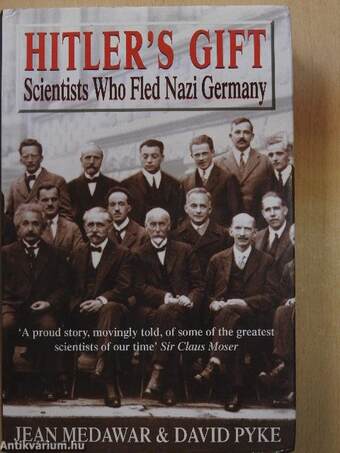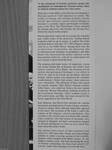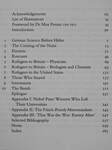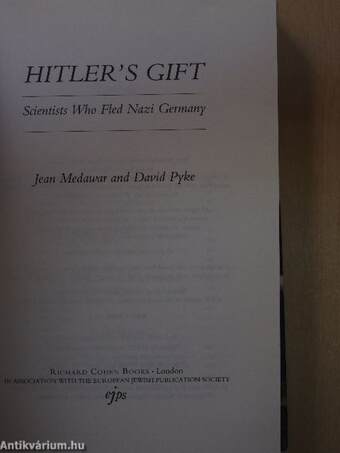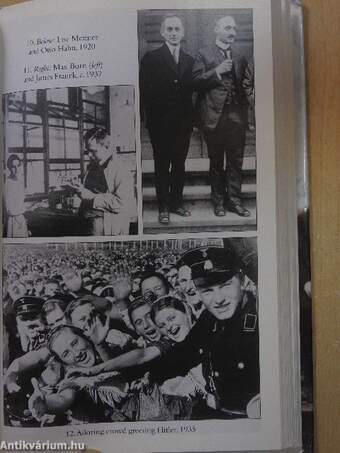1.067.073
kiadvánnyal nyújtjuk Magyarország legnagyobb antikvár könyv-kínálatát

VISSZA
A TETEJÉRE
JAVASLATOKÉszre-
vételek
Hitler's Gift
Scientists Who Fled Nazi Germany
| Kiadó: | Richard Cohen Books-The European Jewish Publication Society |
|---|---|
| Kiadás helye: | London |
| Kiadás éve: | |
| Kötés típusa: | Ragasztott kemény kötés |
| Oldalszám: | 268 oldal |
| Sorozatcím: | |
| Kötetszám: | |
| Nyelv: | Angol |
| Méret: | 24 cm x 16 cm |
| ISBN: | 1-86066-172-6 |
| Megjegyzés: | Fekete-fehér fotókkal. |
naponta értesítjük a beérkező friss
kiadványokról
naponta értesítjük a beérkező friss
kiadványokról
Fülszöveg
'If the dismissal of Jewish scientists means the annihilation of contemporary Germán science, then we shall do without science for a few years.' With these words Hitler closed the door on Germany's fifty-year record of world supremacy in science. The exodus of Germán and Austrian scientists, mostly Jewish. that followed caused critical damage to Germany's scientific output and brought invaluable gains to the West. The Third Reich's losses included the leading physicists who became the driving force behind the atomic bomb project. Britain played the major role in rescuing the scientists and, within weeks of the dismissals, leading British academics had set up an agency to support the exiles and help them to find jobs. Of 1,500 refugees, twenty went on to win Nobel Prizes. Among them were the co-discoverer of penicillin, the physician who revolutionized the treatment of paraplegics. and Max Perutz who discovered the atomic structure of the haemoglobin molecule, with all its... TovábbFülszöveg
'If the dismissal of Jewish scientists means the annihilation of contemporary Germán science, then we shall do without science for a few years.' With these words Hitler closed the door on Germany's fifty-year record of world supremacy in science. The exodus of Germán and Austrian scientists, mostly Jewish. that followed caused critical damage to Germany's scientific output and brought invaluable gains to the West. The Third Reich's losses included the leading physicists who became the driving force behind the atomic bomb project. Britain played the major role in rescuing the scientists and, within weeks of the dismissals, leading British academics had set up an agency to support the exiles and help them to find jobs. Of 1,500 refugees, twenty went on to win Nobel Prizes. Among them were the co-discoverer of penicillin, the physician who revolutionized the treatment of paraplegics. and Max Perutz who discovered the atomic structure of the haemoglobin molecule, with all its implications for how oxygen is taken round the body. The gripping individual stories of emigration, rescue and escape include that of Einstein, the world's most famous scientist; Fritz Haber, the German-Jewish patriot who galvanized Germany's war effort in 1914-18, only to be forced out by Hitler; and Leo Szilárd, restless genius who disproved the scientific establishment's belief that atomic chain reactions were 'moonshine'. The dilemmas of those who stayed are equally dramatic: Max Planck, Germán scientist father-figure, who could not believe the new regime would last; Werner Heisenberg, brilliant inventor of the Uncertainty Principle, whose wartime record is still controversial; and Max von Laue, revered for his heroic opposition to the Third Reich. Jean Medawar and Dávid Pyke describe the wartime internment and deportation of many refugee scientists, classed as enemy aliens although implacably opposed to the Nazis. The invention of the bomb is told in the context of the refugees' crucial contribution. Alsó covered is the curious post-war Farm Hall episode, when scientists who had stayed in Germany were interned in England, and their conversations bugged by British Intelligence to find out how much they knew about the atomic bomb. The authors drew much of their material from interviews with more than twenty surviving refugee scholars to create a moving account of the scientific diaspora which resulted from Hitler's policy. As one refugee scientist vvrote, 'Far from destroying the spirit of Germán scholarship, the Nazis had spread it all over the world. Only Germany was to be the loser.' VisszaTémakörök
- Idegennyelv > Idegennyelvű könyvek > Angol > Természettudományok > Egyéb
- Idegennyelv > Idegennyelvű könyvek > Angol > Művelődéstörténet
- Idegennyelv > Idegennyelvű könyvek > Angol > Történelem > Európa története > Egyéb
- Művelődéstörténet > Eszmetörténet > Tudományok
- Természettudomány > Általános természettudomány > Történet
- Természettudomány > Általános természettudomány > Tudósok
- Természettudomány > Általános természettudomány > Idegennyelvű > Angol
- Történelem > Idegennyelvű > Angol
- Történelem > Legújabb kor > Egyéb
- Idegennyelv > Idegennyelvű könyvek > Angol > Szociológia > Társadalmi csoportok > Kisebbségek > Zsidóság
- Szociológia > Társadalmi csoportok > Kisebbségek > Zsidóság > Egyéb
- Történelem > Kontinensek szerint > Európa, európai országok története > Nyugat-Európa > Németország
- Történelem > Politika > Ideológiák > Nacionalizmus
Megvásárolható példányok
Nincs megvásárolható példány
A könyv összes megrendelhető példánya elfogyott. Ha kívánja, előjegyezheti a könyvet, és amint a könyv egy újabb példánya elérhető lesz, értesítjük.



